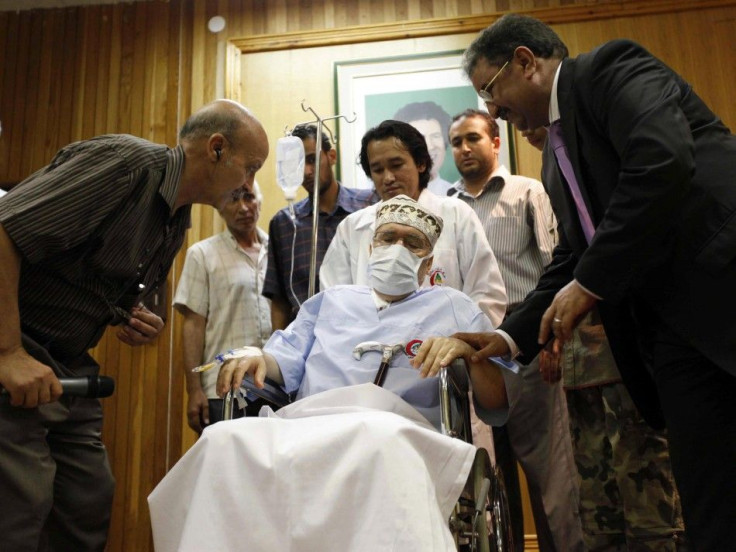U.S. Lawmakers Urge New Moves Against Lockerbie Bomber

New York and New Jersey politicians are demanding that any new government in Tripoli extradite to the United States a Libyan official convicted in Britain for the December 1988 bombing of a U.S.-bound airliner.
Abdel Baset al- Megrahi was convicted by a special Scottish court of participating in the bombing of Pan Am flight 103 over Lockerbie, Scotland. He was sentenced to a minimum prison term of 27 years.
But Scottish authorities released him on medical grounds two years ago, provoking harsh criticism in the United States, where the Justice Department and FBI have a criminal indictment pending against Megrahi and open investigations into the bombing.
While Scottish ministers cited an assessment that Megrahi was terminally ill with prostate cancer and had at most three months to live, he is apparently alive today -- and his fate poses a delicate challenge for Washington and any new Libyan government.
Representative Nita Lowey, a New York Democrat, called on the Libyan rebels' Transitional National Council to engage responsibly with the world community by extraditing Abdel Baset al-Megrahi to the United States to face justice for the Lockerbie bombing.
New Jersey Senator Frank Lautenberg, also a Democrat, wrote to Secretary of State Hillary Clinton suggesting that if Libyan leader Muammar Gaddafi is ever brought before the International Criminal Court, he should also be prosecuted, for ordering the Pan Am 103 bombing.
However, a representative of the TNC indicated the U.S. discussion about Megrahi and Lockerbie is premature. In a written statement, Libyan ambassador Ali Aujali said: Before we can deliver justice to Gaddafi's many victims, we must first bring down the regime and then turn to the important work of forming a new government, writing a constitution, and establishing the rule of law.
The Libyan people, the TNC will obviously have to look at this when they can, said State Department spokeswoman Victoria Nuland.
The secretary's made clear this guy should be behind bars. The Department of Justice has the lead on these issues, she said. No decisions have been made, we have to let Justice do its job here and we also have to have a Libyan government back in Tripoli before these conversations can happen.
COULD GADDAFI BE TARGETED BY US PROSECUTORS?
New York lawyer James Kreindler, who helped Pan Am 103 victims' families negotiate a multibillion dollar settlement with Gaddafi's government, questioned Scottish and British motives for releasing Megrahi, accusing the UK politicians of trading Megrahi's freedom for Libyan oil.
It was all a scam so (British Petroleum) could get its oil leases for Libyan oil fields which they're using to pay for the damage caused by the Gulf (of Mexico) oil spill, Kreindler told Reuters. He said that Megrahi had deliberately refused chemotherapy while imprisoned in Scotland, leading to a deterioration in his health, which then improved after he underwent such treatment upon his release and return to Libya.
British authorities have denied any quid pro quo.
Kreindler said that now that Gaddafi and his entourage appear likely to be driven from power, both the Libyan leader and close associates like Abdullah Senoussi, Gaddafi's spy chief and brother-in-law, could become targets of U.S. investigators and prosecutors.
Justice Department spokesman Dean Boyd, said: We remain firmly committed to bringing to justice everyone who may have been involved in the Pan Am 103 bombing. The Justice Department investigation into the Pan Am 103 bombing that was initiated on December 21, 1988 remains open and active.
While the decision to release Megrahi was made by Scottish officials, documents published by the Scottish government indicated that officials of the British government, which at the time was headed by Labor Party prime minister Gordon Brown, supported the Scottish decision.
In a statement, a spokesperson for the British Embassy in Washington sought to distance Britain's current Conservative leader, David Cameron, from the Megrahi release decision, saying that the Prime Minister has made clear that the Scottish Government decision to release Al-Megrahi was wrong and misguided.
But the spokesperson added that Britain had no mechanism in place to request a person who has been released on compassionate grounds to be returned to prison if they have survived for longer than the period diagnosed by the relevant medical authorities.
© Copyright Thomson Reuters 2024. All rights reserved.





















